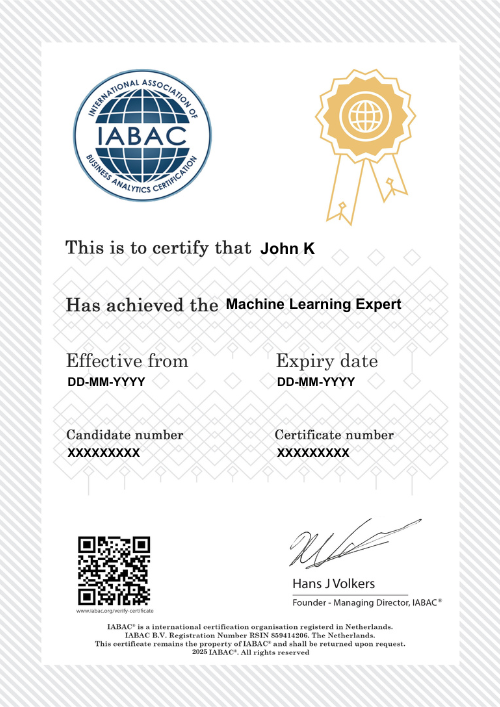
Instructor Led Live Online
Self Learning + Live Mentoring
Customize Your Training
The following topics are covered in "Machine Learning"
Foundation:
Machine Learning Introduction: Supervised and Unsupervised Learning
Multiple Linear Regression
Decision Tree:
Naive Bayes:
Support Vector Machines:
Association Rule:
Expert:
Neural Net:
Random Forest:
Recommendation Engine:
Dimension Reduction:
Machine Learning is the future because it enables automation at scale, personalizes user experiences, and continuously improves over time. As data volumes grow, ML will be key to unlocking new innovations across industries.
For beginners, learning the fundamentals of ML can take 3–6 months with consistent practice. Mastery, including advanced algorithms and deployment skills, may take 1–2 years depending on your background.
The most popular languages are:
Career paths after ML training include:
Key skills include:
Machine learning is a subset of artificial intelligence that enables machines to imitate intelligent human behavior.
Machine learning provides businesses with the ability to extract value from corporate and consumer data, leading to better decision-making and a competitive edge.
Some popular machine learning tools include SAS, Apache Hadoop, Tableau, BigML, Knime, RapidMiner, Excel, Apache Flink, and Power BI.
Yes. Many beginner-friendly courses, tutorials, and no-code tools are available. However, gradually learning programming and math fundamentals will help you progress faster.
Yes. Machine Learning is a subset of Artificial Intelligence that focuses on developing systems capable of learning from data and improving performance over time without explicit programming.
Machine Learning is widely used in:
The three main types are:
Yes, but a basic understanding of statistics, linear algebra, and probability will help you grasp algorithms more effectively. Many courses start with a math primer for beginners.
While coding skills (especially in Python or R) are highly beneficial, beginners can start with no-code ML tools. However, to work on complex projects and build custom models, programming knowledge is essential.
Machine Learning is significant because it powers modern AI applications from recommendation engines and fraud detection to autonomous vehicles and medical diagnostics making processes smarter, faster, and more efficient.
Machine Learning is rapidly evolving with advances in deep learning, natural language processing, and computer vision. Cloud-based ML services and open-source tools have made it accessible to businesses and individuals worldwide.
Machine learning engineer salaries vary by location. In the United States, the average salary is $131,001 per year, in Germany it is €53,589 per year, and in India, it is INR 8,50,397 per year.
Machine learning certifications validate your skills and enhance job prospects in a technology-driven world where companies are seeking machine learning professionals.
DataMites offers the following Machine Learning Certification programs:
The Machine Learning course has a duration of 2 to 5 months, with a total of 120 hours of training. Training sessions are conducted on weekdays and weekends, providing flexibility to choose based on your availability.
The Machine Learning course fee at DataMites typically ranges between INR 30,000 and INR 60,000, depending on the program level.
Yes. Upon successfully completing the training and assessments, you will receive a Course Completion Certificate accredited by IABAC (International Association of Business Analytics Certifications), recognized globally.
Absolutely. DataMites offers free demo sessions so you can experience the teaching style, trainer expertise, and course content before making a payment.
DataMites has a dedicated Placement Assistance Team that offers:
Yes. The programs are structured to start with fundamentals before progressing to advanced concepts, making them suitable for learners with no prior coding or AI background.
Yes. DataMites provides real-time project internships with partner companies, giving you practical exposure and industry experience to strengthen your resume.
Definitely. All Machine Learning courses at DataMites include capstone projects and domain-specific case studies to ensure you gain practical, job-ready skills.
There is no strict eligibility requirement. However, having basic knowledge of mathematics, statistics, or programming can be an advantage. The course is designed to cater to both freshers and experienced professionals.
Yes. Flexible EMI plans are available for most courses to make payments more manageable. You can choose monthly or quarterly installments depending on the plan.
DataMites trainers are industry experts with years of experience in AI, data science, and machine learning, often holding certifications from global bodies and having worked on real-world ML projects.
Yes. DataMites offers a refund policy under certain conditions, usually if you decide not to proceed after attending the first few sessions.
DataMites is preferred for its expert trainers, comprehensive curriculum, hands-on projects, and strong placement support.
Students receive comprehensive study materials, recorded sessions, project guides, and practice datasets.
The DataMites Placement Assistance Team(PAT) facilitates the aspirants in taking all the necessary steps in starting their career in Data Science. Some of the services provided by PAT are: -
The DataMites Placement Assistance Team(PAT) conducts sessions on career mentoring for the aspirants with a view of helping them realize the purpose they have to serve when they step into the corporate world. The students are guided by industry experts about the various possibilities in the Data Science career, this will help the aspirants to draw a clear picture of the career options available. Also, they will be made knowledgeable about the various obstacles they are likely to face as a fresher in the field, and how they can tackle.
No, PAT does not promise a job, but it helps the aspirants to build the required potential needed in landing a career. The aspirants can capitalize on the acquired skills, in the long run, to a successful career in Data Science.











